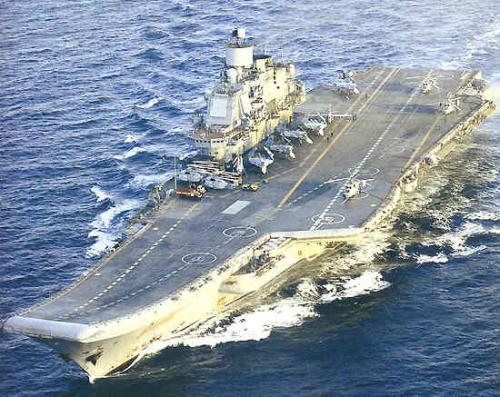
Putin’s Agenda: Gunboat Diplomacy
Publication: Eurasia Daily Monitor Volume: 8 Issue: 225
By:

Since announcing his return to the presidency on September 24, Vladimir Putin has regained the limelight (though he never lost the power) attached to the direction of Russian foreign policy. The results have not been long in coming. Putin has been a vocal champion of the new Customs Union and the larger Eurasian Economic Community (EurAsEC) of which it is a part. But beyond that issue, he has equally clearly articulated a new muscularity in Russian foreign policy. That was evident in President Dmitry Medvedev’s November 23 speech on missile defense and his subsequent remarks. But it does not end there. We also see this muscular response to perceived slights and threats in Russia’s new resort to what can only be called gunboat diplomacy in both Syria and Cyprus. This is not altogether surprising. Russia lost heavily, both economically and politically in Libya and stands to lose even more should the Assad regime go the way of Muammar Gaddafi. Likewise, in Cyprus, Russia has considerable equities at stake. Already in 2007, the then Commander-in-Chief of the Russian Navy, Admiral Vladimir Masorin stated that the Mediterranean was a very important naval theater for Russia. Nevertheless, this employment of the navy abroad represents a new departure for Moscow.
Moscow has recently attacked the US for sending the USS George H.W. Bush aircraft carrier to the Syrian Coast and will send its only carrier and three other warships to “deter” an alleged allied invasion, even though nobody has such plans (Izvestiya, November 27; Interfax, December 1; Moskovskiy Komsomolets, November 22). Similarly, the Chief of the General Staff, Army-General Nikolai Makarov, raised the possibility that any local war, e.g. the civil war now taking shape in Syria, could escalate into all-out war, even one involving Russia, and that could lead to nuclear war – something for which Moscow is prepared according to its 2010 military doctrine (Kommersant, November 18). Makarov had earlier warned that the Russian military must learn to prepare for a Libyan scenario, which could include NATO bombing (www.66.ru, October 4).
Beyond sending warships to deter this non-existent invasion, Moscow also broadcast the fact that it had revived the sale to Syria of supersonic cruise anti-ship missiles, the Yakhont, as part of the mobile Bastion coastal missile defense system (Interfax-AVN, December 1). At the same time, Deputy Prime Minister, Sergei Ivanov, said that Russia sees no obstacles to continuing to “honor its contracts” with Syria and send it weapons as long as it is not prohibited to do so (Interfax, December 1). And since Russia will veto any UN sanctions resolution, the way is open to continue doing so. However, it is not very likely that these systems, operating alone and without the other weapons systems needed to protect them, can truly deter an invasion if one was contemplated (Ekho Moskvy, December 1).
Moreover, Moscow can fulminate against NATO, but it will not ultimately do anything to provoke a conflict with NATO on behalf of Bashar Assad, and it looks increasingly likely that Syria will be torn apart by civil war and that Assad has lost the mandate of heaven. Therefore, this Politique du Geste is likely to avail Moscow little.
In Cyprus’ case the circumstances are quite different, but the response of sending warships is once again Russia’s favored modus operandi. Turkey’s threats against Cyprus and Israel, due to their exploration and drilling for gas in the Easterm Mediterranean, caused concern in Russia. Moscow recently organized a large loan to Cyprus to sustain it against a crisis should Greece default, because so many Russian accounts are held in Cyprus’ banks and then reinvested in Russia or used to launder the elite’s money by cycling it out of Russia into the global banking system. Clearly Moscow cannot allow Cyprus to go under. Turkish threats, therefore, deeply disturb both Cyprus and Russia. Indeed, once Turkey’s navy openly threatened Cyprus for signing an agreement with the Texas based firm Noble Energy that is a partner with Israel in developing Israel’s maritime gas fields, Russia’s foreign ministry publicly backed Cyprus’ right to develop its Mediterranean gas. Cyprus, in turn, labeled Moscow “a shield against any threats by Turkey” (Sunday’s Zaman, October 23; Israel Hayom, September 23). Furthermore, Russia dispatched an aircraft carrier with fighter planes and at least one submarine to Cyrpus as a show of support in an open example of gunboat diplomacy (Cyprus Mail, October 2; www.asianews.it, October 5).
These two disparate incidents show Moscow’s willingness to use its navy to defend its friends against threats, and up the ante by threatening others with major wars. This combination of gunboat diplomacy and brinksmanship is vintage Putin. While it may be an election ploy (which clealry did not work), it also underlines his tendeny to react aggressively to any perceived threats and to hype them up out of all proportion. These cases suggest that Putin has fallen victim to the special services’ oldest trick of distoring actual threats and trends in international affairs for their own international benefit, since there is not the slightest sign of anyone in NATO, including the US, making overt threats against Syria or for that matter Cyprus that go beyond somewhat overheated rhetoric concerning Cyprus from Turkey. If such muscularity and distorted threat perceptions constitute a major aspect of the “new” Putin’s agenda, not even the electoral blow on December 4, will serve to restrain Russia’s innate tendency to over-reaction and even adventurism during his upcoming presidency.




